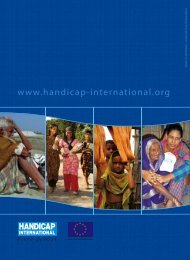Full page photo print - Harvard Law School Project on Disability
Full page photo print - Harvard Law School Project on Disability
Full page photo print - Harvard Law School Project on Disability
Create successful ePaper yourself
Turn your PDF publications into a flip-book with our unique Google optimized e-Paper software.
which in Article 3(3) calls for c<strong>on</strong>sultati<strong>on</strong> with and active involvement of people with disabilities<br />
in the implementati<strong>on</strong> of the CRPD .<br />
Violati<strong>on</strong>s of other human rights can also negatively impact the enjoyment of the right to<br />
freedom of expressi<strong>on</strong> and opini<strong>on</strong> by people with disabilities . For example, lack of access to<br />
educati<strong>on</strong> can hamper the opportunities for people with disabilities to acquire knowledge and<br />
learn skills that c<strong>on</strong>tribute to developing of ideas and sharing of those ideas with other people .<br />
Violati<strong>on</strong> of the right to privacy may discourage people with disabilities from expressing their<br />
ideas in letters or other forms that they feel may be subject to search or c<strong>on</strong>fiscati<strong>on</strong>. Such<br />
c<strong>on</strong>cerns may be heightened for people who do not enjoy the right to live independently and in<br />
the community but live in instituti<strong>on</strong>al settings where the right to privacy may not be sufficiently<br />
respected by staff or others living there .<br />
Despite the importance of the right to freedom of expressi<strong>on</strong> and opini<strong>on</strong>, people with disabilities<br />
face numerous barriers to full enjoyment of this right . For instance, many people with<br />
disabilities lack access to informati<strong>on</strong> in accessible formats . Although numerous formats and<br />
technologies already exist, these accessible formats are often not widely available, especially<br />
in developing countries where accessible technologies are unaffordable for many people with<br />
disabilities . This is certainly true for mainstream media, where not all televisi<strong>on</strong> programmes<br />
are broadcast with subtitles, capti<strong>on</strong>ing, or inset sign language interpretati<strong>on</strong> for deaf viewers,<br />
or audio descripti<strong>on</strong> for viewers who are blind or have visual impairments . Few newspapers are<br />
available in Braille in a timely manner for readers who are blind, and fewer still offer c<strong>on</strong>tent in<br />
plain language suitable for people with intellectual disabilities . Despite the growing use of the<br />
Internet as a source of news and a means of research, many websites remain inaccessible to<br />
people with disabilities . Emerging technologies, such as digital broadcasting and broadband,<br />
have the potential to enhance the accessibility features available to people with disabilities .<br />
However, this potential will <strong>on</strong>ly be realised if decisi<strong>on</strong>-makers resp<strong>on</strong>sible for how informati<strong>on</strong><br />
is distributed are aware of the need to address accessibility and are willing to listen to the views<br />
of product users who have disabilities .<br />
As with other human rights, <strong>on</strong>e of the greatest barriers to enjoyment of the right to freedom<br />
of expressi<strong>on</strong> and opini<strong>on</strong> can be the attitudes of others . Prevailing social attitudes and<br />
stereotypes often create an envir<strong>on</strong>ment in which the opini<strong>on</strong>s of people with disabilities are<br />
not welcome . Even when they do express themselves, their ideas and opini<strong>on</strong>s may not<br />
be accepted as worthy of c<strong>on</strong>siderati<strong>on</strong> <strong>on</strong> an equal basis with those of others . People with<br />
intellectual and psycho-social disabilities comm<strong>on</strong>ly face pressure from others to c<strong>on</strong>form not<br />
<strong>on</strong>ly in their way of thinking, but also in their methods of expressing themselves, to a manner<br />
c<strong>on</strong>sidered “more acceptable .” Some people with psychosocial disabilities have noted that<br />
forced treatment involving psychotropic medicati<strong>on</strong>s can interfere substantially with a pers<strong>on</strong>’s<br />
thought processes, making it difficult to think clearly and formulate opini<strong>on</strong>s. In some cases the<br />
actual objective of using these therapies is to alter the way people with psycho-social disabilities<br />
think and express themselves, so that their behavior and beliefs do not offend or upset other<br />
people . This treatment is often defended by the argument that it is in the pers<strong>on</strong>’s best interests<br />
to avoid thoughts, ideas, and opini<strong>on</strong>s that are “not rati<strong>on</strong>al .”<br />
In summary, the right to freedom of expressi<strong>on</strong> and opini<strong>on</strong> is essential to the ability of people<br />
with disabilities to develop as individuals and to participate in societies <strong>on</strong> an equal basis with<br />
others . However, full enjoyment will remain elusive for people with disabilities as l<strong>on</strong>g as<br />
access, attitudinal, and other barriers exist .<br />
62 humAn RighTs. yes! AcTi<strong>on</strong> And AdvocAcy <strong>on</strong> The RighTs of PeRs<strong>on</strong>s wiTh disAbiliTies




